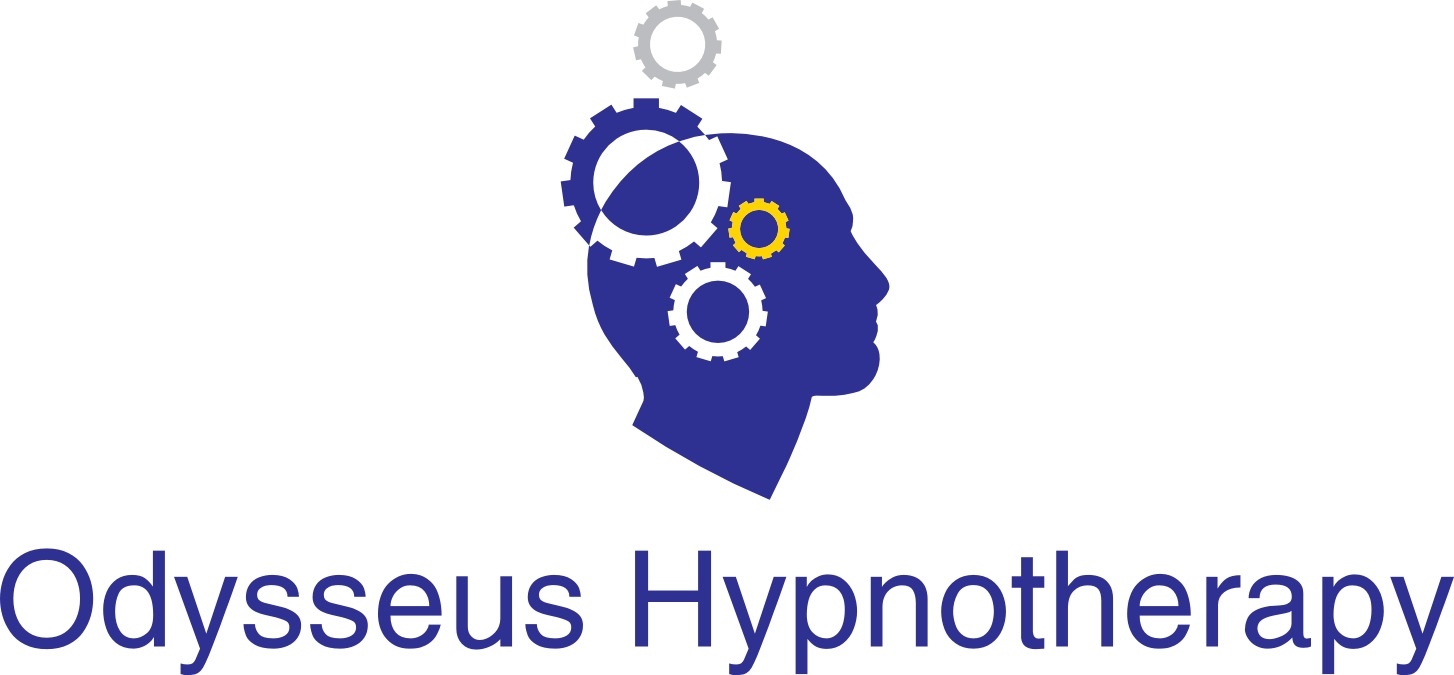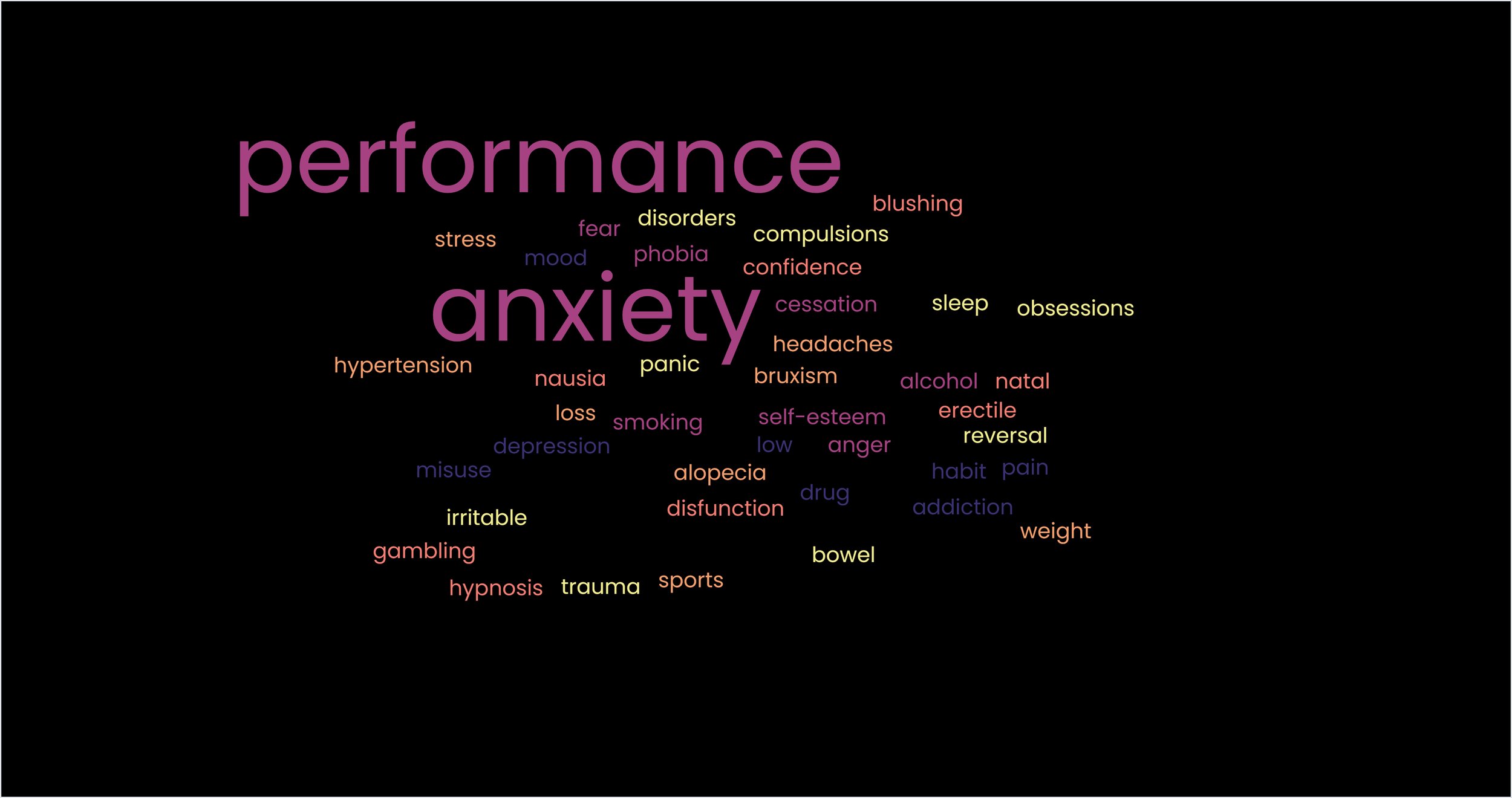Anxiety
"Self-hypnosis training represents a rapid, cost-effective, nonaddictive and safe alternative to medication for the treatment of anxiety related conditions... The tremendous volume of research provides compelling evidence that hypnosis is an efficacious treatment for state anxiety (e.g., prior to tests, surgery and medical procedures) and anxiety related disorders..." (Hammond DC. Hypnosis in the treatment of anxiety and stress-related disorders. Expert Rev Neurother. 2010).
Pain Management
Studies have shown that hypnosis can alter our perception of pain, even at it's most severe. A meta-analysis of 13 controlled studies, conducted by the Department of Psychiatry and Behavioural Sciences in Texas, concluded that hypnosis consistently produced significant decreases in pain associated with a variety of chronic pain problems such as arthritis, cancer and lower back problems. Hypnosis has been shown to reduce distress and pain associated with medical procedures (Lang et al. 1996, Lang et al. 2000, Lang et al. 2006 and Lambert 1996) and reduce the frequency and intensity of headaches and migraine (Hammond 2007). It can also be beneficial for chronic pain patients in reducing anxiety, improving sleep and enhancing quality of life (Jensen, McArthur et al. 2006).
Tinnitus
Hypnosis can be an effective treatment for the symptoms of tinnitus. It is common for tinnitus to develop after periods of stress. Where tinnitus already exists, it often worsens during periods of stress. The condition itself can increase stress, creating a vicious cycle. Relaxation, the development of effective coping strategies and restructuring the way you think about the symptoms of tinnitus are some of the ways in which hypnosis can offer relief from tinnitus
High Blood Pressure (Hypertension)
A study of hypertensive patients taught self hypnosis skills showed a greater reduction in diastolic blood pressure than control groups (Raskin in et al., 1999).
Sleep Disorders (Insomnia)
Sleep loss is a significant contributor of obesity, depression, diabetes 2, immune suppression, psychiatric illness, increased use of stimulants and sedatives, memory loss, attention failure, poor decision making and an increased cancer risk. Take back control of your sleep.
The use of hypnosis has been shown in studies to improve quality and duration of sleep and reduce the time taken to fall asleep (Anderson, Dalton, Basker., 1979).
Chronic Stress
A modern day health epidemic according to The World Health Organisation. Continual stress over a prolonged period will take its toll on your body as well as your emotional well-being. Learning effective strategies to control your reaction to stress and anxiety can reduce the risk to your health contributing to low mood, depression and anxiety, poor sleep, immune deficiency, reduced cognitive performance, premature aging and cardiovascular disease. Studies have demonstrated the beneficial affects of hypnosis for sufferers of stress and anxiety.
Alopecia
Alopecia Areata (AA) is an autoimmune disease leading to loss of scalp hairs. The disease seems triggered by stress. Twenty-eight patients with extensive AA, all refractory to previous conventional treatment, were treated with hypnosis at the Academic Hospital UZ Brussel, Brussels, Belgium. Twelve out of 21 patients, including 4 with total loss of scalp hair, presented a significant hair growth. All patients presented a significant decrease in scores for anxiety and depression. The results demonstrate that hypnotic interventions may ameliorate the clinical outcome of patients with AA and may improve their psychological well-being (Willemsen R, et al. Int J Clin Exp Hypn. 2008).
Headaches
A study on the effectiveness of hypnosis in dealing with recurring headaches found that the group trained in self-hypnosis reported significant reductions on the Headache Index Score than the waiting list control group (ter Kuile et al., 1994)
Irritable Bowel Syndrome and other Gastroesophageal Disorders
Some of the best research evidence supporting the effectiveness of clinical hypnosis lies in the field of gastroesophageal disorders.
A study involving 204 people suffering from IBS found that more than 80% of those reporting initial relief following 12 weekly sessions of hypnosis were still improved up to six years later (Gut, November 2003).
In a study using hypnosis to prevent relapse of duodenal ulcers, 53% of the hypnosis group relapsed compared to 100% of the control group (Colgan, Faragher & Whorwell, 1988).
Research has also demonstrated the effectiveness of hypnosis in treating gastroesophageal reflux disease (GERD) and other esophageal disorders and inflammatory bowel disease, including Crohn disease and ulcerative colitis. Research shows significant improvements in symptoms such as abdominal pain and bloating and bowel dysfunction
Weight Loss
Hypnosis combined with Cognitive Behavioural Therapy (CBT) more than doubled average weight loss (Kirsch, 1996). In this meta-analysis, average mean weight loss without hypnosis was 6.3 pounds but with hypnosis was 14.88 pounds. Furthermore, the benefits of hypnosis increased substantially over time, demonstrating it's effectiveness for long-term weight loss. In a separate study (Cochrane, Gordon, Friesen J. 1986), an average of 17 pounds was lost by the hypnosis group compared to an average of 0.5 pounds lost by the control group at follow-up.
Fear of Flying - Sky's the limit
As well as assisting clients in overcoming anxiety disorders and stress, addictions, weight issues, Irritable Bowel Syndrome (IBS), high blood pressure, pain, confidence, motivation and performance, Philip Roberts at Odysseus Hypnotherapy is also an aviation geek. He has had a keen interest in aviation since an early age and his knowledge of aircraft systems and operation is particularly advantageous in helping clients deal with the anxiety of flying. Learn more about fear of flying here.
Smoking Cessation
Researchers at the University of Iowa carried out a meta-analysis, statistically combining the results of more than 600 studies covering almost 72 000 people from America, Scandinavia and elsewhere in Europe and found that hypnosis is the most effective way of giving up smoking and significantly outperformed all other methods.
Bruxism
(teeth grinding)
In this pilot study, an objective baseline of the bruxing was established using a portable electromyogram (EMG) detector attached over the masseter muscle during sleep. The bruxers showed a significant decrease in EMG activity with hypnosis and experienced less facial pain. Their partners also reported less bruxing noise immediately following treatment and at follow-up after 4 to 36 months Clarke, Reynolds., 1991).
Erectile Dysfunction (ED)
In a study published in 2003 in the British Journal of Urology International, hypnotherapy helped to improve the sexual function of men with non-organic impotence at a rate of 80%. Hypnotherapy outperformed both testosterone (60%) and trazodone (67%). Men who received a placebo had only a 39% improvement rate. A study published in 1997 in the Scandinavian Journal of Urology and Nephrology also showed that hypnotherapy is effective when treating impotence that cannot be linked to physical causes. The success rate for hypnotherapy was 75%, while the success rate for placebo was 43-47%.
The American Medical Association (AMA) accepted hypnosis in 1958 as an effective method for treating stress and stress-related symptoms. Therefore, when the cause of ED is self-imposed mental pressure or anticipatory anxiety, it makes sense that hypnosis can be effective. Hypnosis can also be beneficial when erectile dysfunction is due to depression, alcohol, smoking, and drug use.
Natal Hypnosis and Hypnobirthing
Numerous studies have shown hypnosis to be an effective intervention for managing stress and anxiety, low mood, nausea and pain, smoking and alcohol misuse. It can also be a useful skill for building confidence and self esteem. There are many ways in which hypnosis could help during and after pregnancy for both expectant mothers and fathers.
Other issues
The above are just an overview of some of the more common issues treated by Odysseus Hypnotherapy. It wouldn't be possible to provide an exhaustive list but hypnotherapy can be applied in so many circumstances. The Odysseus Hypnotherapy Facebook page includes posts covering many issues that benefit from studies into the effectiveness of hypnosis. If you would like to discuss your particular issue in the strictest confidence, contact Philip Roberts at Odysseus Hypnotherapy now. Just click on the 'CONTACT' button below.
Try the Odysseus 30 minute Mind Massage
Relaxation is utilised during hypnosis sessions to enable us to become inwardly absorbed and focused on our intended therapeutic outcomes. Evidence suggests that practicing deep relaxation can be so therapeutic in itself. Deep relaxation can have many physiological benefits such as reducing stress, improving concentration, lowering blood pressure, alleviating fatigue, enhancing mood and more. Experience a soothing 30 minute mind massage at Odysseus Hypnotherapy that will leave you feeling revitalised.
IMPORTANT Whilst there is a wealth of evidence to support hypnotherapy for the easement of symptoms such as pain and the advancement of recovery times, the underlying cause of pain or other physical symptoms should first be fully investigated by medical professionals and you should continue with any course of treatment recommended by your medical practitioner throughout hypnotherapy sessions to ensure that the underlying condition can be dealt with.
If you feel that you are at risk of harming yourself or others you should seek help from a suitably qualified health or social care professional without delay.
Other sources of advice, information and support
FREE INITIAL CONSULTATION Choosing the right therapist for you is so important which is why Philip Roberts at Odysseus Hypnotherapy provides a free 30 minute initial consultation by phone or Skype. This gives you an opportunity to ask any questions you may have, find out more about hypnosis and discuss the issue you need help with. Click on 'CONTACT' now to email or message Philip to arrange a FREE INITIAL CONSULTATION
REDUCED HOURLY FEE FOR FIRST THERAPY SESSION AND PRE-PAID SESSION BLOCKS (Go to the 'OUR APPROACH' page for session information including fees).

